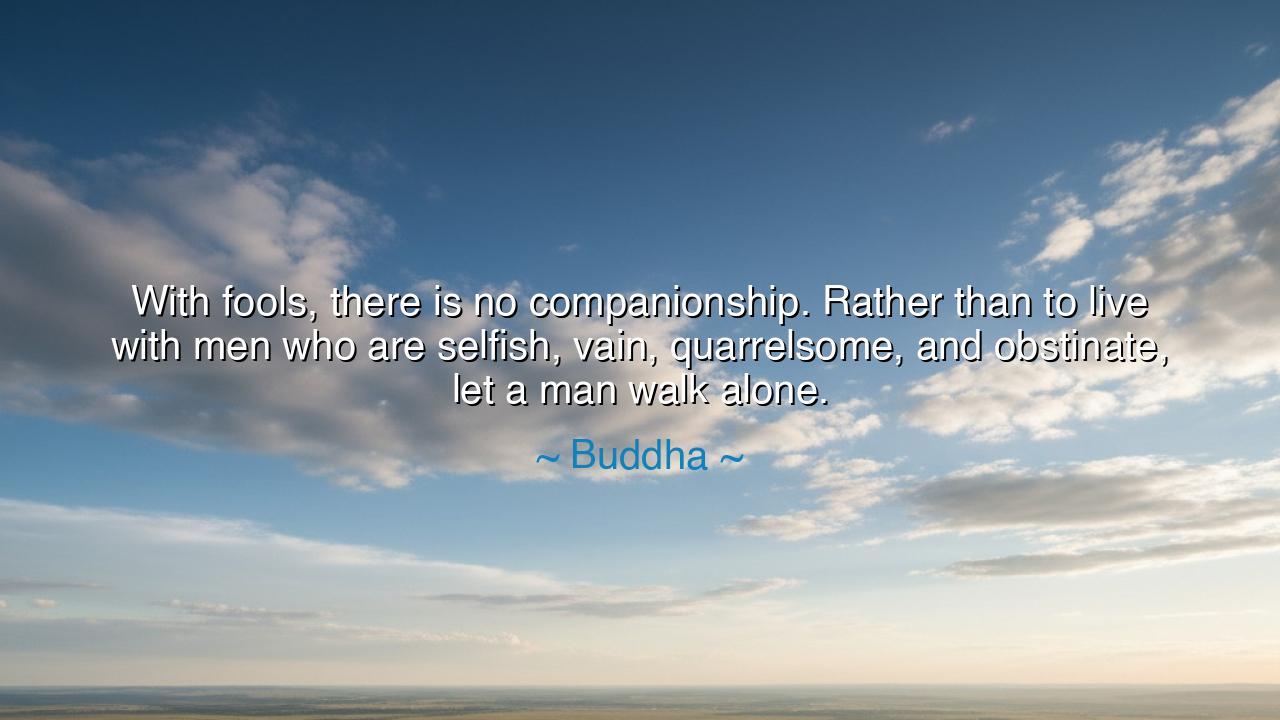
With fools, there is no companionship. Rather than to live with
With fools, there is no companionship. Rather than to live with men who are selfish, vain, quarrelsome, and obstinate, let a man walk alone.






"With fools, there is no companionship. Rather than to live with men who are selfish, vain, quarrelsome, and obstinate, let a man walk alone." These words from Buddha strike at the heart of the human need for true companionship—a companionship that is rooted in mutual respect, wisdom, and inner peace. Buddha’s teachings invite us to reflect on the nature of our relationships and the detrimental effects that arise from spending time with those who bring only negativity and discord into our lives. The essence of his message is clear: to seek solitude is better than to endure the company of those whose hearts are driven by selfishness, vanity, quarrels, and stubbornness.
In this world, it is far too easy to become entangled in relationships that pull us away from our peace and purpose. We may find ourselves surrounded by those who complain incessantly, who drag us into conflict, or who seek to manipulate and control. These people, as Buddha suggests, are like storms—they disrupt the serenity of our minds and often lead us further from our true path. Rather than finding solace in their company, we are drawn into their chaos, losing sight of the tranquility that is essential for our spiritual growth. Buddha’s words teach us that companionship with such individuals does not foster growth or understanding, but only deepens the despair and frustration within.
Consider the life of Socrates, the great philosopher of ancient Greece. Socrates famously walked alone in his search for wisdom, not because he was unable to form relationships, but because he understood the value of the soul’s peace. He surrounded himself only with those who sought truth and virtue, and distanced himself from those who were ruled by ignorance or self-interest. Socrates believed that in the company of wise men, one could nurture the soul and engage in meaningful discourse. But when surrounded by those who sought only to argue or win debates rather than seek wisdom, he chose to walk alone, knowing that in solitude, his spirit would find clarity and peace.
In the ancient stories, we find numerous examples of wise men who walked the path of solitude rather than succumb to the toxic influence of harmful relationships. Gautama Buddha, in his own life, withdrew from his royal family and the comforts of palace life to search for the truth in silence and isolation. It was in that time alone, away from the distractions of material wealth and social expectations, that he found the enlightenment that would transform his life and the lives of others. Buddha’s decision to leave behind the familiar for the unknown was not a rejection of all relationships, but rather an understanding that only by distancing himself from the foolishness of society could he truly find the inner peace that would allow him to see the world with clarity and compassion.
Similarly, we can think of Leonardo da Vinci, whose genius is often attributed not only to his intellectual brilliance but also to his ability to isolate himself from the distractions of the world. Da Vinci sought the company of only those who shared his passion for creativity, innovation, and the pursuit of truth. He did not allow himself to be swayed by the frivolous concerns of the court or the petty quarrels of his time. His decision to immerse himself in his work, often alone, was a deliberate choice—one that allowed him to focus on the creation of works that would change the world forever. In his solitude, da Vinci found the freedom to explore his vision, unclouded by the noise of the masses.
The lesson Buddha imparts is one of discernment in our relationships. He teaches us that the quality of our companions can either elevate us or drag us down. To walk alone, in this context, is not to forsake companionship but to prioritize the quality of our relationships over the quantity. We must be willing to choose peace over conflict, virtue over vanity, and wisdom over ignorance. There is no shame in walking alone if it means that we protect our inner peace and spiritual integrity. It is often in solitude that we find our true selves, where we can listen to the quiet voice of our conscience and align ourselves with our highest purpose.
In practical terms, this means we must evaluate our relationships and ask ourselves if they contribute to our growth and peace. Are the people we surround ourselves with nurturing our mental clarity and emotional stability? Or are they pulling us into cycles of negativity and discontent? If we find ourselves in the company of those who are selfish, vain, quarrelsome, and obstinate, we must have the courage to distance ourselves from them, for the sake of our peace and well-being. Sometimes, it is better to be alone than to endure relationships that drain us of the very energy we need to grow and serve others.
Buddha’s wisdom reminds us that true companionship is found not in the numbers of people we surround ourselves with, but in the quality of those relationships. If we walk with those who seek truth and virtue, our journey will be one of growth and peace. But if we find ourselves surrounded by those who are lost in selfishness and ignorance, it is better to walk alone, for in solitude we can find the strength to become who we were meant to be. Let us, then, be mindful of the company we keep and remember that the path to inner peace may often require us to walk alone.






AAdministratorAdministrator
Welcome, honored guests. Please leave a comment, we will respond soon